How to Build Strong Relationships with Remote Developers
Build Strong Relationships with Remote Developers
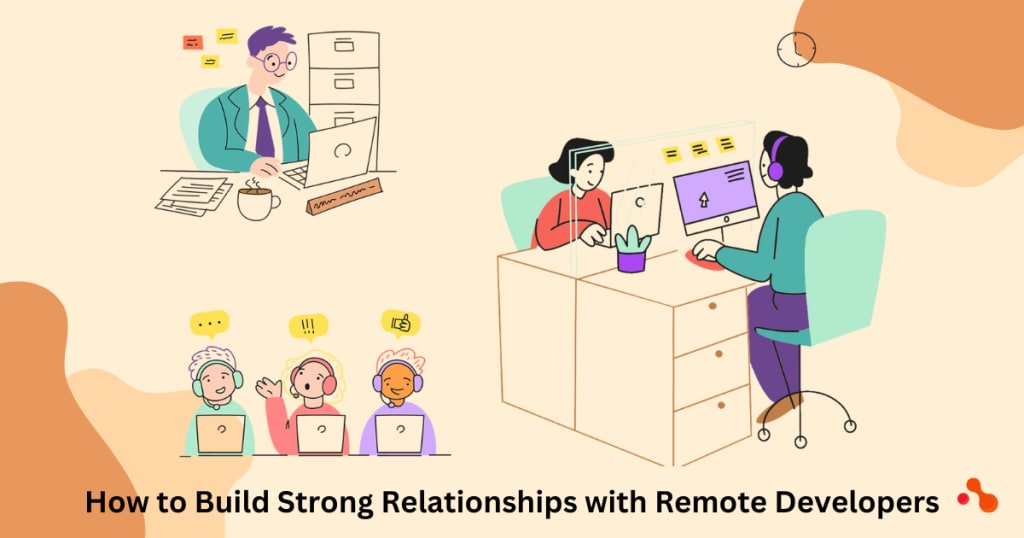
Introduction
In today's digital landscape, the role of remote developers has become increasingly vital. Companies often hire remote developers to leverage their specialized skills and benefit from the flexibility they offer. However, building relationships with remote developers presents unique challenges. This blog aims to provide valuable insights and strategies for establishing strong connections with remote developers. By fostering effective communication, trust, support, and a sense of belonging, you can unlock the true potential of your remote developer team.
Effective Communication
Clear and timely communication is super important! It helps people understand each other better and prevents misunderstandings. Here are some cool things you should know about communication:
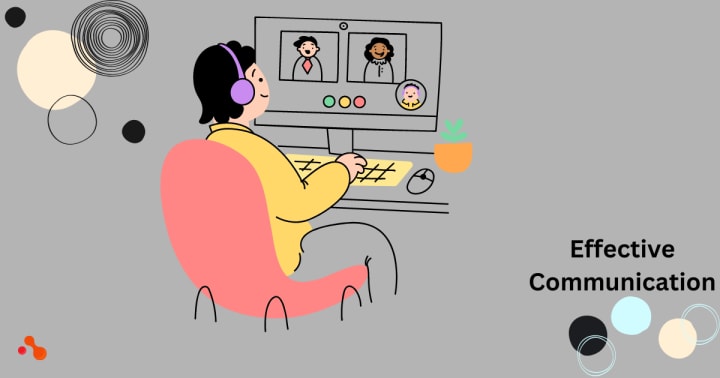
1. Communication Channels:
- Email: It's like sending letters online. You can write detailed messages and attach files.
- Chat: It's like texting but on the computer. You can have quick conversations and send emojis too!
- Video Calls: Imagine talking to someone face-to-face through your computer or phone. You can see and hear each other in real-time.
1. Response Times and Availability:
- When someone sends you a message, it's nice to reply as soon as possible. This shows that you respect their time and care about what they say.
- Let others know when you're available and when you might be busy. For example, if you're hire remote developers, you could say, "I'm usually online from 9 AM to 5 PM, Monday to Friday."
1. Active Listening and Feedback:
- When someone is talking or messaging you, give them your full attention. Show that you're interested in nodding, making eye contact (during video calls), or using appropriate responses like "I see" or "That's interesting."
- If someone asks for your opinion or feedback, try to be helpful and constructive. For example, if you're reviewing a developer's work, instead of saying, "This is bad," you could say, "I like how you did this, but maybe you can improve that part."
1. Open and Honest Communication:
- Creating an environment where people feel comfortable expressing their thoughts and feelings is important. Please encourage others to speak up by listening without judgment and appreciating their honesty.
- For example, if you're working with a team of developers, you can say, "I value everyone's opinions and ideas. Don't hesitate to share your thoughts, even if they're different from mine."
Remember, effective communication is like a secret ingredient to successful teamwork. It helps everyone work together smoothly, whether you're hiring developers or simply talking with friends. So, keep practising and have fun communicating!
Establishing Trust
Building trust with remote developers is essential for successful collaboration and achieving project goals. Here are some effective strategies to establish trust in a remote working environment, making it easy for 16-year-old kids to understand:

1. Consistent and Transparent Interactions:
- Regularly communicate with remote developers using tools like video calls, instant messaging, or email.
- Share project updates, expectations, and progress openly and honestly.
- Provide timely feedback and address any concerns or questions they may have.
1. Clearly Defined Goals and Objectives:
- Clearly outline the project's purpose, desired outcomes, and deadlines.
- Break down complex tasks into smaller, manageable goals, allowing remote developers to understand their roles and contribute effectively.
- Provide clear instructions and guidance on how to achieve these goals.
1. Assigning Responsibilities and Empowering Remote Developers:
- Delegate specific tasks to remote developers based on their skills and expertise.
- Encourage autonomy by allowing them to make decisions within their assigned responsibilities.
- Trust their judgment and allow them to explore innovative solutions.
1. Trust-Building Activities:
- Organize team-building exercises, such as virtual icebreaker games or collaborative problem-solving activities.
- Host virtual meetups or casual chats to allow remote developers to socialize and build personal connections.
- Create opportunities for remote developers to share their hobbies, interests, or achievements with the team.
1. Recognizing and Acknowledging Achievements:
- Celebrate the accomplishments of remote developers by publicly acknowledging their contributions and successes.
- Provide positive feedback and appreciation for their hard work.
- Consider virtual rewards or certificates to recognize their achievements.
For example: Imagine you have hire remote developers of team to create a mobile app. To build trust, you regularly communicate with them using video calls and messaging platforms, sharing updates and answering their questions. You would clearly define the app's goals and break down tasks, allowing each developer to know their responsibilities. You could organize virtual team-building activities, like online scavenger hunts, where the developers work together to solve puzzles. Additionally, you would publicly recognize their achievements when milestones are reached, giving them virtual certificates or rewards to make them feel appreciated and motivated.
By implementing these strategies, trust between you and the remote developers will be fostered, creating a positive and productive working environment for everyone involved.
Providing Support and Resources
To ensure remote developers have everything they need to thrive, we take several steps:
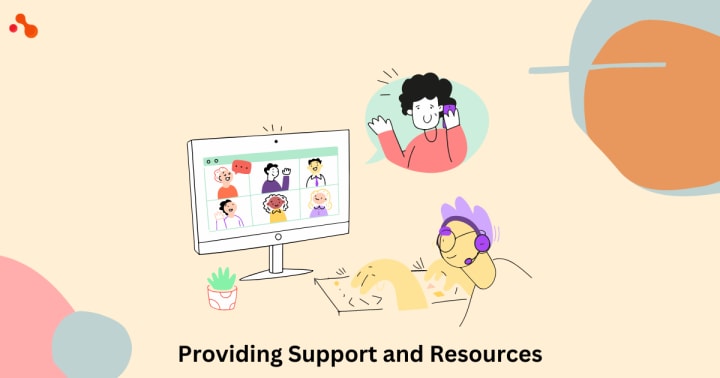
1. Equipping Remote Developers:
- Providing necessary tools: We ensure our remote developers can access essential software, such as coding environments, project management tools, and communication platforms.
- Supplying hardware: We send them the required equipment, such as laptops or monitors, so that they can work effectively from their own space.
1. Offering Technical Support:
- 24/7 Helpdesk: Our technical support team is available round the clock to assist remote developers with any technical issues they encounter during their work.
- Troubleshooting Assistance: We offer guidance and troubleshooting steps through live chats, emails, or video calls to address software or hardware challenges they may face.
1. Providing Documentation and Knowledge Bases:
- Comprehensive Guides: We provide clear and concise documentation that covers various aspects of our projects, including coding conventions, best practices, and guidelines. This ensures developers have easy access to essential information.
- Knowledge Base Access: We maintain a centralized knowledge base where remote developers can find answers to frequently asked questions, technical resources, and helpful tutorials.
1. Encouraging Continuous Learning:
- Online Courses and Webinars: We offer remote developers access to online courses and webinars covering a wide range of topics related to their work. This allows them to enhance their skills and stay up-to-date with industry trends continuously.
- Mentorship Opportunities: We connect remote developers with experienced professionals who can guide them, answer their questions, and provide career advice.
1. Fostering a Supportive and Inclusive Environment:
- Team Collaboration: We promote regular communication and collaboration among remote developers through virtual meetings, chat platforms, and shared project spaces. This creates a sense of belonging and teamwork.
- Celebrating Diversity: We recognize and appreciate the unique backgrounds, experiences, and perspectives of our remote developers, fostering an inclusive environment where everyone feels valued and respected.
By taking these measures, we ensure that remote developers have the necessary tools, support, and resources to excel in their roles. We strive to create an engaging, inclusive work environment that encourages continuous learning and professional growth.
Building a Sense of Belonging
Creating a sense of belonging is important for hire remote developers to feel connected and part of the team. Here are some strategies to foster a strong team bond and promote a positive work environment:
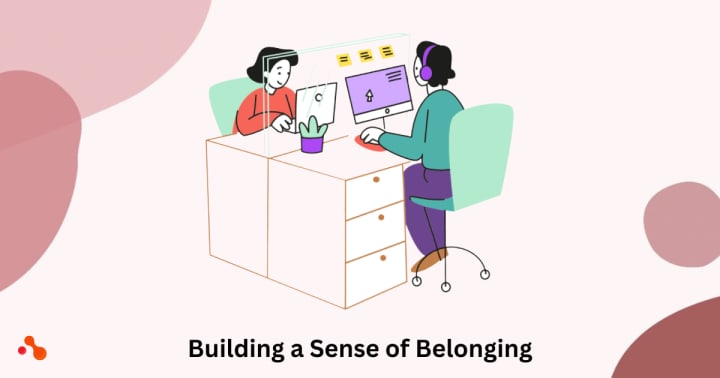
1. Connect with the team:
- Encourage regular virtual meetings or video conferences where remote developers can interact with their colleagues. This helps them build relationships and feel included.
- Set up a dedicated communication channel, such as a chat platform, where developers can share ideas, ask questions, and engage in casual conversations.
1. Virtual events and casual chats:
- Organize virtual events like team-building activities, game nights, or online workshops. These events allow remote developers to socialize and bond with their colleagues.
- Encourage casual chats or virtual coffee breaks where team members can gather informally to discuss non-work topics or share personal experiences. This helps create a friendly and relaxed atmosphere.
1. Cultivate a collaborative and diverse team culture:
- Emphasize the value of collaboration by promoting teamwork and encouraging developers to work together on projects. This fosters a sense of unity and shared goals.
- Celebrate diversity within the team by acknowledging and appreciating different cultural backgrounds, perspectives, and experiences. This can be done through virtual celebrations of cultural holidays or by sharing interesting facts about various cultures.
1. Recognize achievements and milestones:
- Acknowledge the accomplishments of remote developers and celebrate their milestones. Virtual recognition programs, such as employee spotlights or shout-outs during team meetings, can do this.
- Provide opportunities for remote developers to showcase their skills or expertise. This could include virtual presentations or knowledge-sharing sessions where they can share their insights with the team.
1. Virtual coffee breaks and team-building activities:
- Schedule virtual coffee breaks where team members can join a video call to chat, relax, and get to know each other better. This informal setting promotes social interactions and strengthens relationships.
- Organize virtual team-building activities like online trivia games, collaborative challenges, or virtual escape rooms. These activities encourage teamwork, problem-solving, and fun interaction among team members.
By implementing these strategies, remote developers can feel a sense of belonging, fostering a positive and inclusive work environment that promotes collaboration, diversity, and social connections within the team.
Conclusion
In conclusion, hire remote developers can greatly benefit your team. You can build strong relationships and foster a productive working environment by implementing the strategies discussed. Embrace the power of remote collaboration and watch your projects thrive!
About the Creator
Mukesh Ram
I founded Acquaint Softtech Private Limited with a vision to make quality developers affordable to everyone. With my blood, sweat, and tears I haven’t just been able to sustain but thrive over the years.
Enjoyed the story? Support the Creator.
Subscribe for free to receive all their stories in your feed. You could also pledge your support or give them a one-off tip, letting them know you appreciate their work.


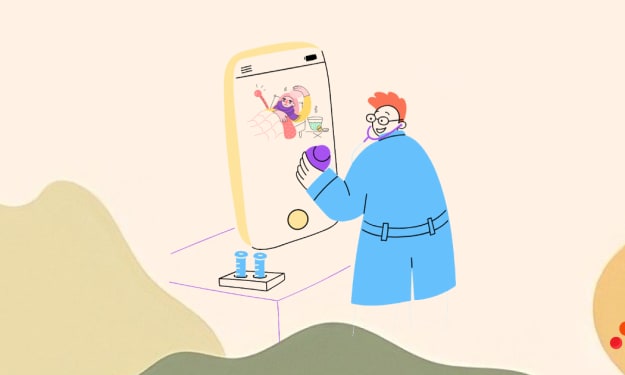



Comments
Mukesh Ram is not accepting comments at the moment
Want to show your support? Send them a one-off tip.